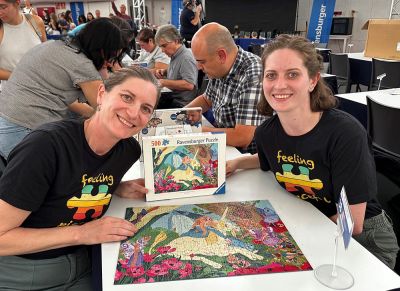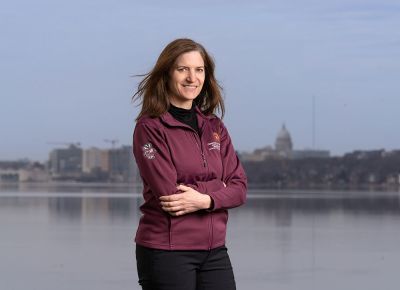For Katharine Greenfield, MD ’16, her journey to becoming a family medicine physician was anything but conventional. Growing up in an Alaskan fishing town with parents deeply connected to the outdoors — her father was a fisherman, and her mother worked for the forest service — Greenfield’s earliest memories are of the sea and the forest. At 2 years of age, she was having adventures as a deckhand, setting the stage for a life intertwined with nature.
After high school, Greenfield initially pursued a biology degree but found herself more engaged in college rowing than academics. “I spent more hours on the water than at the library, and as a result, I didn’t have the grades to continue,” she remembers. Although still intrigued by biology and the possibility of a career helping others, Greenfield wasn’t ready to commit to a lengthy academic path. She enrolled in a technical college in Bellingham, Washington, where she explored small-appliance repair and electrician courses, eventually attending a heavy-equipment school in Portland, Oregon. Despite the challenges of these male-dominated fields, Greenfield thrived and eventually moved to Reno, Nevada, to work and live near her aunt. For a decade, she honed her problem-solving skills and developed meticulous attention to detail while running heavy equipment, grading construction sites, and eventually working for a land-survey company. However, the land-survey profession was changing and would require a four-year degree to advance within the field.
“When I realized I would need a degree to progress beyond where I was in the field, I realized that I still wanted to pursue the science education I had abandoned all those years ago,” shares Greenfield. “I wanted to combine my love for science with my passion for helping others and make a more direct impact on people’s lives.”
This led her to return to undergraduate studies in biochemistry and molecular biology, this time at the University of Nevada; the transition culminated in realizing that her ultimate desire was to pursue medical school. Though she was then a single parent, Greenfield thrived in the university setting that had once daunted her. Medical school was soon within reach, but she did not feel she had the flexibility afforded to students at a different stage in life.
“As a single parent with young children, I faced the additional challenge of trying to get into medical school without disrupting my family’s life in Reno,” adds Greenfield, a fact that limited her application pool.
After being waitlisted twice at the University of Nevada, Reno School of Medicine, Greenfield broadened her scope and took a leap with her family. That leap led her to the University of Wisconsin School of Medicine and Public Health (SMPH), where she found her “true home.”
Upon earning her medical degree from the SMPH, she chose the Medical College of Wisconsin’s Fox Valley Family Medicine Residency Program in Appleton, Wisconsin. This was a natural fit, as she felt an immediate connection during her residency interview and appreciated the varied experiences the program offered.
“In Wisconsin, I felt an unparalleled sense of community and support for my family,” Greenfield notes.
Initially envisioning a practice in a town smaller than Madison or Appleton, Greenfield found the perfect environment for her personal and professional life at the UW Health Sun Prairie Clinic.
According to Greenfield, her diverse background gives her a unique perspective in her medical practice, helping her relate to older patients and blue-collar workers, and understanding the implications of missing work and living paycheck to paycheck. Her empathy allows her to connect with a wide variety of patients and helps her be a compassionate, effective physician.
Greenfield is passionate about women’s health, focusing on issues like birth control and menopause. She also is interested in health informatics, having received Epic Systems builder training and serving as an alpha user for several artificial intelligence (AI) pilot programs at UW Health. These technologies, she believes, can significantly improve the ease of practice and reduce cognitive burden for physicians.
“Integrating AI technology into health care can transform the ways we deliver care while improving patient outcomes,” she explains. Greenfield’s advice to new students pursuing family medicine is to find something they are passionate about within and outside the field. She emphasizes the importance of work-life balance and encourages students to cultivate and enjoy their interests. “Balancing your professional and personal life is crucial for long-term success and happiness,” she advises.

Greenfield (left) and her daughter, Nicole Kunkler, at the World Jigsaw Puzzle Competition in Valladolid, Spain.
Outside of medicine, Greenfield enjoys spending time outdoors, traveling, and doing puzzles — a hobby she shares with her daughter. They have participated in multiple speed-puzzling events, including the World Jigsaw Puzzle Championship in Spain. Greenfield still enjoys rowing and has helped teach learn-to-row courses in the summer at Mendota Rowing Club. She draws on her rowing experiences from her undergraduate years to instill teamwork and mental toughness in the medical students she mentors.
Greenfield’s journey from the rugged outdoors to the medical field exemplifies her resilience and adaptability. Her diverse experiences not only enrich her medical practice but also serve as an inspiration to her patients and colleagues. By blending her love for nature, science, and helping others, she has carved out a unique and impactful path in family medicine, showing that unconventional routes can lead to extraordinary destinations.
Originally appeared in SMPH Quarterly Volume 27, Number 1, 2025 (PDF)
Published: May 2025

